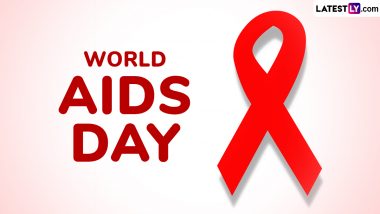World AIDS Day is not just about raising awareness—it’s a call to action. The day emphasizes the importance of education, early testing, and regular treatment for HIV. It’s a reminder that despite significant progress in HIV treatment and prevention, the fight is far from over. The ongoing challenges of stigma, discrimination, and unequal access to healthcare still affect millions worldwide. World AIDS Day encourages solidarity, compassion, and commitment to ending the HIV/AIDS epidemic once and for all. On World AIDS Day 2024, we bring you this year's theme and significance, how is it different from HIV and other important details that you must know. World AIDS Vaccine Day 2024 Date and Theme: Know Significance of the Day Promoting the Need for a Vaccine To Prevent HIV Infection and AIDS.
World AIDS Day 2024 Date, Theme and Significance
World AIDS Day is observed annually on December 1, providing an opportunity for people worldwide to unite in the fight against HIV/AIDS, support those living with the virus, and remember those who have lost their lives to AIDS-related illnesses. The day is marked by global awareness campaigns, educational programs, and fundraising initiatives aimed at ending the stigma surrounding HIV/AIDS, improving access to care, and working towards an eventual cure. The World AIDS Day 2024 theme is "Take the Rights Path: My Health, My Right!" As we approach World AIDS Day 2024, it’s important to understand both the historical context and the scientific realities of HIV/AIDS, and how they continue to affect millions of people worldwide. Getting Tattoo Can Infect You With HIV? 68 Women Diagnosed With AIDS in 4 Years in Ghaziabad, 20 of Them Blame Tattoos for HIV Infection.
What Is AIDS?
AIDS, or Acquired Immunodeficiency Syndrome, is the final stage of HIV (Human Immunodeficiency Virus) infection. If left untreated, HIV can lead to AIDS, a condition in which the immune system is severely damaged, making the body vulnerable to infections and certain cancers that it would normally be able to fight off. AIDS is characterized by a significantly weakened immune system, and individuals diagnosed with AIDS are more likely to experience life-threatening illnesses. While there is no cure for AIDS, modern treatment with antiretroviral therapy (ART) can help manage the virus, allowing individuals to live longer and healthier lives. The global observance of World AIDS Day highlights the ongoing need for education, prevention, and support for people living with HIV/AIDS.
The Difference Between HIV and AIDS
Although the terms HIV and AIDS are often used interchangeably, they refer to different stages of the same disease. HIV (Human Immunodeficiency Virus) is the virus that causes AIDS. HIV attacks and weakens the immune system, specifically targeting CD4 cells (T cells), which are crucial for defending the body against infections. If left untreated, HIV can progress over time and eventually lead to AIDS.
On the other hand, AIDS is the most advanced stage of HIV infection. Not everyone who has HIV will develop AIDS, thanks to advancements in medical treatment, particularly the use of antiretroviral therapy (ART). When someone with HIV reaches the stage of AIDS, their immune system is severely compromised, and they may develop opportunistic infections (such as tuberculosis or pneumonia) or certain cancers. However, with early diagnosis and consistent treatment, people living with HIV can prevent the progression to AIDS and live a healthy life.
(The above story first appeared on LatestLY on Nov 22, 2024 05:03 PM IST. For more news and updates on politics, world, sports, entertainment and lifestyle, log on to our website latestly.com).













 Quickly
Quickly




















